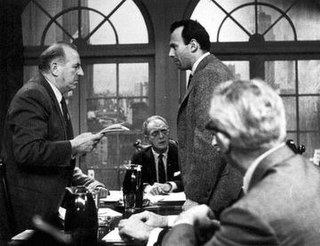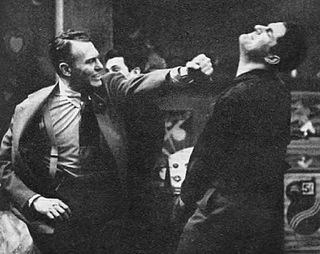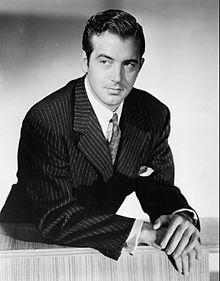
Lux Video Theatre is an American television anthology series that was produced from 1950 until 1957. The series presented both comedy and drama in original teleplays, as well as abridged adaptations of films and plays.

Boris Karloff (1887–1969) was an English actor. He became known for his role as Frankenstein's monster in the 1931 Frankenstein, leading to a long career in film, radio, and television.

Kraft Television Theatre is an American anthology drama television series running from 1947 to 1958. It began May 7, 1947 on NBC, airing at 7:30 p.m. on Wednesday evenings until December of that year. It first promoted MacLaren's Imperial Cheese, which was advertised nowhere else. In January 1948, it moved to 9 p.m. on Wednesdays, continuing in that timeslot until 1958. Initially produced by the J. Walter Thompson advertising agency, the live hour-long series offered television plays with new stories and new characters each week, in addition to adaptations of such classics as A Christmas Carol and Alice in Wonderland. The program was broadcast live from Studio 8-H at 30 Rockefeller Plaza, currently the home of Saturday Night Live.

The First Hundred Years was the first ongoing TV soap opera in the United States that began as a daytime serial, airing on CBS from December 4, 1950 until June 27, 1952.
The Philco Television Playhouse is an American television anthology series that was broadcast live on NBC from 1948 to 1955. Produced by Fred Coe, the series was sponsored by Philco. It was one of the most respected dramatic shows of the Golden Age of Television, winning a 1954 Peabody Award and receiving eight Emmy nominations between 1951 and 1956.

Alcoa Theatre is a half-hour American anthology series sponsored by the Alcoa Corporation and telecast on NBC at 9:30 pm on Monday nights from September 30, 1957 to May 23, 1960. For its first four months on the air, the title Turn of Fate was used as an umbrella title for Alcoa Theatre and its alternate-week counterpart, Goodyear Theatre.

Wire Service is an American television drama series that aired on ABC as part of its 1956–57 season lineup.
Celebrity Time was an American game and audience participation television series that was broadcast on ABC in 1949 - 1950 and on CBS in 1950 - 1952. The original host was Douglas Edwards.
Actors Studio is an American television series that was hosted by Marc Connelly. It originally aired on ABC from September 26, 1948 to October 26, 1949 and then on CBS from November 1, 1949, to June 23, 1950. It was one of the first series to be picked up by a network after being cancelled by another network. CBS departed from its own precedent when it took the World Video-owned series. Until then it had not shown any sustaining programs that were not owned by CBS.
Colgate Theatre is a 30-minute dramatic television anthology series telecast on NBC from 1949 to 1950.

Man Against Crime starring Ralph Bellamy, one of the first television programs about private eyes, ran on CBS, the DuMont Television Network and NBC from October 7, 1949, to June 27, 1954, and was briefly revived, starring Frank Lovejoy, during 1956. The show was created by Lawrence Klee and was broadcast live until 1952. The series was one of the few television programs ever to have been simulcast on more than one network: the program aired on both NBC and DuMont during the 1953–54 television season.

The Bigelow Theatre is an American anthology series originally broadcast on CBS Television and on the DuMont Television Network.
The Chevrolet Tele-Theatre is an American anthology series that aired live on NBC Mondays at 8 pm EST from September 27, 1948 to June 26, 1950. The program presented both news headlines and live dramatic performances of either original plays or works adapted for television from the stage. Sometimes the show was referred to as Chevrolet on Broadway or The Broadway Playhouse; particularly when the program was presenting an adapted stage work from New York City's theatre scene.
Academy Theatre is an American drama anthology television series that aired on NBC from July 25, 1949, to September 12, 1949. It ran for eight weeks as the summer replacement for Chevrolet on Broadway.
Who Said That? is a 1948–55 NBC game show that ran on radio and television, in which a panel of celebrities attempted to determine the speaker of a quotation from recent news reports.
Club Seven is an American television variety series that was broadcast on ABC. The initial series, with 30-minute episodes, ran from August 12, 1948, through March 17, 1949. It was revived on September 11, 1950, and ran through September 28, 1951. Its episodes varied in length "since it was often truncated by five- or ten-minute newscasts or other series on either end." The show attempted to make viewers feel as if they were in a nightclub.
Lights Out is an American television anthology series that featured dramas of thrills and suspense. Broadcast on NBC from July 12, 1949, until September 29, 1952, it was the first TV dramatic program to use a split-screen display.

I Cover Times Square is an American television newspaper drama and crime show that was broadcast in prime time on ABC from October 5, 1950, through January 11, 1951. A subsequent shift to daytime on Saturdays extended the program through October 13, 1951.
Ripley's Believe It or Not is an American television series that was broadcast on NBC from March 1, 1949, through October 5, 1950.
Menasha the Magnificent is an American television situation comedy that was broadcast on NBC from July 3, 1950, through September 11, 1950.









